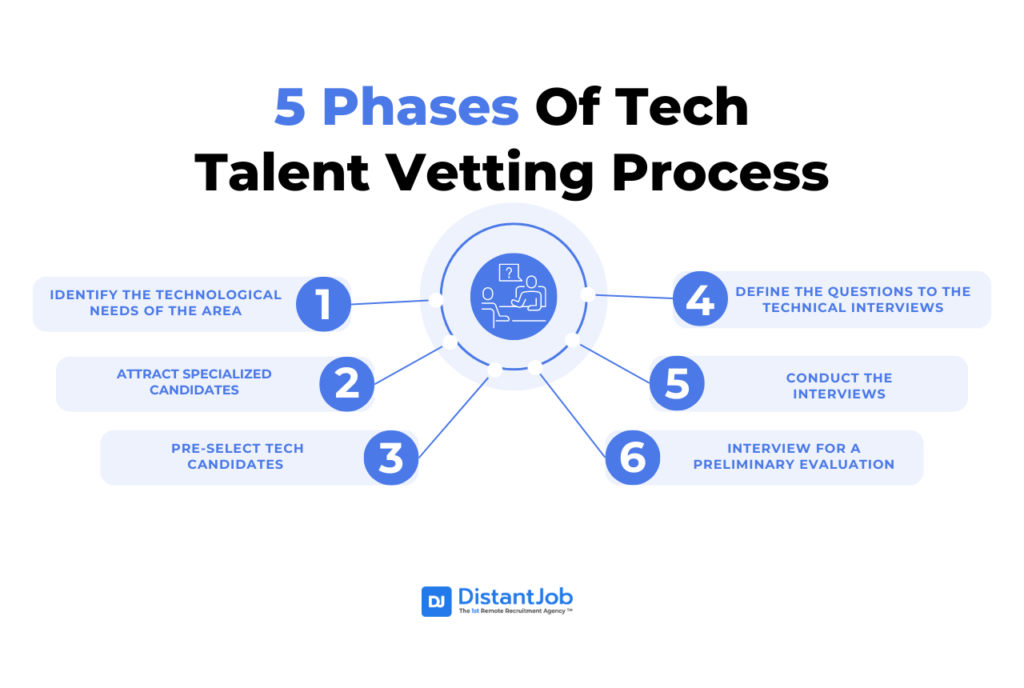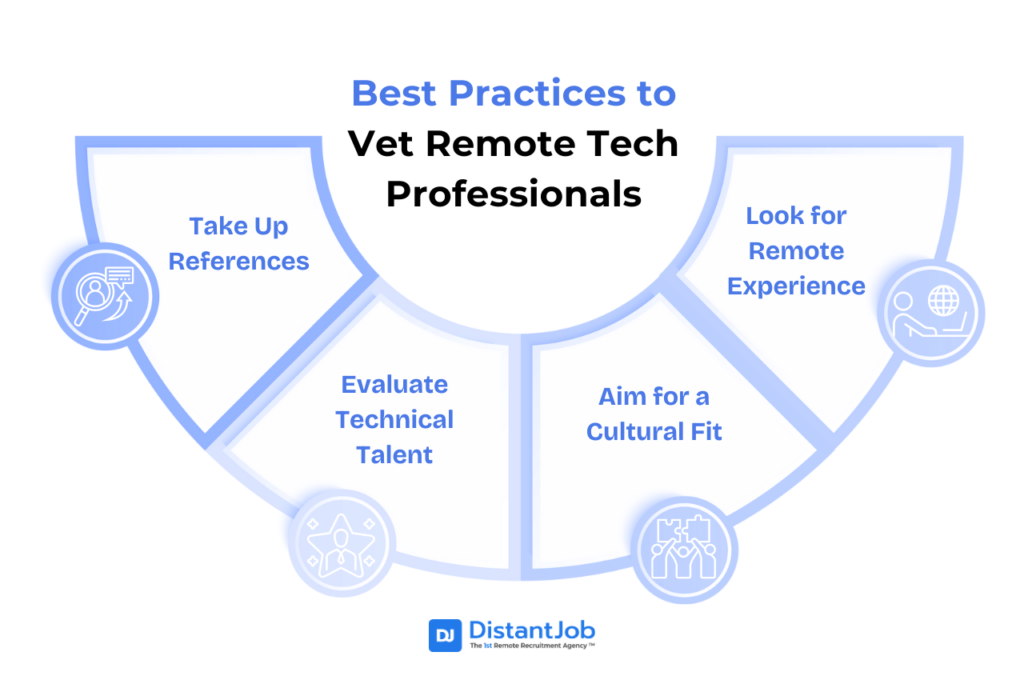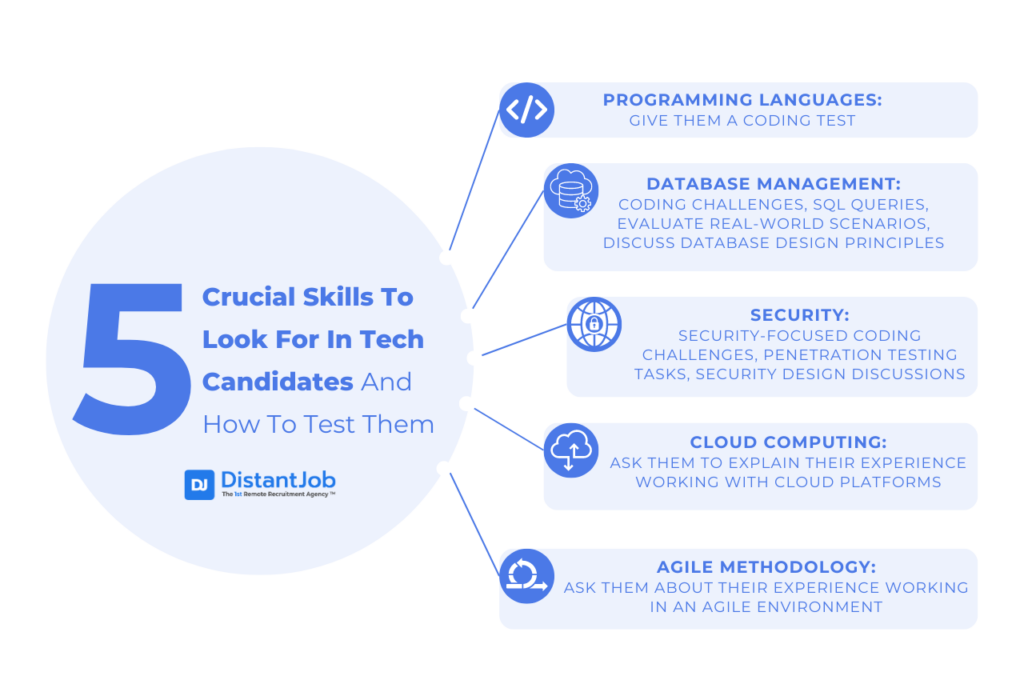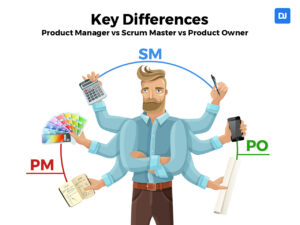Vetting engineers effectively requires a multi-stage, data-driven approach that cuts through the noise of a rapidly expanding talent pool that often overshadows exceptional talent. The best assessment process combines technical tests, personality tests, reference checking, and a cultural fit check.
According to the World Economic Forum, by 2025, the technical talent gap will be between 68,000 and 112,000 software developers. This means that company recruiters and talent evaluators will have to learn key technical aspects to find the most suitable engineering candidates.
You must develop effective strategies, such as learning to ask the right questions and implementing efficient evaluation processes to identify the most suitable candidates quickly and accurately. How exactly is this process conducted? To help you, we’ll share some of our top tips developed in over 15 years of finding the best remote talent for our clients.
5 Phases of Tech Talent Vetting Process

Vetting is a comprehensive and meticulous evaluation process designed to thoroughly assess and carefully select the most qualified and suitable professionals to fill critical job positions in the ever-evolving technology sector.
This rigorous procedure involves a detailed examination of candidates’ skills, experience, and cultural fit to ensure they align perfectly with the organization’s needs and values.
Every company in the technology sector or whose internal processes require a specialized technical profile must be clear about the capabilities that a technology engineer must have to fill the position.
Whether due to company growth, area growth or innovation, getting technology talent is not a short process but can be divided into 5 phases:
1. Identify the technological needs of the area
When a technology area requires a highly specialized technical profile, it is important to prepare a list of qualities and knowledge the candidate must be capable of.
In most cases, the area leader will be responsible for providing you with this list, which includes essentials such as academic training, knowledge of required software and other essential aspects.
However, it may happen that the company does not have an area leader who can provide you with this information, especially if it seeks to grow and incorporate new technical talent to expand its operations.In this case, it will be necessary to understand the needs the area wants to fulfill and the technological shortcomings that hiring a qualified engineer hopes to solve.
2. Attract specialized candidates
Choosing the right channel (platforms like LinkedIn, Indeed, or industry-specific job boards) for attracting candidates and writing a detailed vacancy is key to increasing the chances of getting the ideal candidate.
You can do this by following these suggestions:
- Give an overview of the organization, the field in which the candidate is sought, as well as the reasons for seeking the position. This helps attract candidates who align with your company’s mission and are excited about the work you’re doing. This approach informs candidates about the job and appeals to those seeking particular work environments or opportunities to work with specific technologies.
- Clearly delineate the type of experience required: a junior profile with little experience and the ability to learn or a senior engineer with knowledge and the ability to drive the company forward.
- List the technical knowledge the candidate must have, separating them into two groups: essential knowledge and preferable knowledge. For example, if you require the profile to be an expert in a programming language, software, or framework.
3. Pre-select the engineering candidates to advance in the process
A recruiter’s most important responsibility is to ensure that only candidates with the experience and knowledge requirements advance to technical assessments.
Therefore, take the time to separate each application you receive. The more technical and specialized the profile, the more difficult it will be to identify the ideal candidate. To do this, separate the candidates into groups before the interviews according to their technical knowledge and years of experience.
3. Define the questions that will determine if a candidate can advance to the technical interviews
To prepare the questions, you will have to delve into the technology field and create scenario-based interview questions.
These questions should be based on real-world problems your company is currently facing. You can better gauge a candidate’s practical skills and problem-solving abilities in contexts that matter to your organization .
For example, to assess a candidate’s expertise in a programming language, consider asking:
- Where they acquired their skills: formal education, self-learning, on-the-job experience, and so on.
- Specific projects or practical cases they’ve worked on using the language.
- Challenges they’ve encountered and how they overcame them.
- How they would approach a current technical situation your company is facing.
4. Conduct the interviews of the first phase of the hiring process
Finally, you will have to conduct the interviews. In most cases, remote interviews are conducted for technology profiles. Remember to ensure that your connection is stable so as not to have any problems.
📚 Related: How to Optimize the IT Recruiting Process Timeline?
5. Interview for a preliminary evaluation of potential job engineering candidates
Once you have selected your first candidates for a preliminary interview, you must determine what type of evaluation will help you identify if they fit the requirements for the position.
To do this, you can use one of these 3 types of interview techniques, depending on your objectives:
- Practical exercises during the interview: This type of interview assesses a candidate’s ability to apply technological knowledge in real-world scenarios. Set a specific task and ask the candidate to outline the completion steps. For preliminary interviews, avoid real exercises. Instead, use a series of questions and answers to gauge practical skills.
- Design-focused Interview: Use design questions for roles requiring information architecture skills and development capability decisions. Ask open-ended questions about system design, technology choices, and problem-solving. Ensure questions are specific yet allow detailed explanations. Examples: “How would you design an e-commerce database?” or “What factors matter in microservice architecture selection?” Align questions with the company’s candidate requirements.
- Case-Based Interview: Use real-case scenarios to evaluate candidates on specific projects, use real-case scenarios. This assesses their ability to analyze problems and propose solutions. These interviews reveal the candidate’s problem-solving approach and verify their technical knowledge for the position.
Best Practices to Vet Remote Tech Professionals

At DistantJob, we help clients, and we support vet candidates all day, every day. Over the years, we’ve gained experience with what works and what doesn’t – here’s what we’d suggest you include in your process:
Take Up References
Getting a response to a reference request was a time-consuming task that often didn’t get completed until your new starter was on-site and working. With more rapid communication, getting opinions from previous employers or other references within hours is possible.
If you can, set up a phone call to talk to the ex-employer.
It will let you ask questions that matter to you, like how that person worked under pressure or what part of the stack they know.
Here are some questions you can use to get the candidate to share information about technical project experience:
- How does the candidate handle tight deadlines or unexpected challenges?
- What experience do they have with specific technologies or frameworks relevant to your project?
- How do they approach problem-solving and debugging complex issues?
- What are their preferences for team collaboration and communication?
Evaluate Technical Talent
The traditional way of vetting tech candidates was the infamous whiteboard test. We’ve elaborated on the issues with that approach in the past, but in effect, it relies on the developer having a good memory rather than proving their ability to problem-solve with all the knowledge of the internet at their fingertips.
Instead, new methods of evaluating technical talent have emerged.
Coding challenges on platforms like HackerRank and LeetCode have become popular tools for assessing candidates’ technical skills. These assessments evaluate coding abilities and provide insights into a candidate’s problem-solving approach, coding style, and ability to work under pressure.
Additionally, tools such as Codility and CodeSignal offer customizable technical assessments that can be tailored to specific job requirements.
Beyond the Interview
We’ve found that the best indicator of a ‘good fit’ isn’t so much technical skill as it is cultural fit.
Employees perform better if they feel a sense of belonging to your team, so you need to make sure that their expectations of work align with yours. Take some time in the interview to discuss what’s expected in terms of working hours.
Remote Experience
Although many people now work from home, they may yet to have the full experience. Working at home continuously, in the long term, has its challenges and isn’t for everyone.
A good way to find a software engineer for a remote job is by choosing someone who has worked remotely before.
You need to ask your vetted candidate questions about how they might handle some of those obstacles if they don’t have a track record of online delivery.
We’re talking about things like distraction, time management, and what they will do if they find themselves in need of help when no one else is online. Scenario-based questions are the easiest way to get someone to explain their approach. Here are a few examples:
- Distraction scenario: “Imagine you’re working on a critical project with a tight deadline, but you keep getting notifications from coworkers about non-urgent matters. How would you handle this situation to stay focused and meet your deadline?”
- Time management scenario: “You have three tasks due by the end of the day: debugging a critical issue, attending a team meeting, and completing documentation for a new feature. How would you prioritize and manage your time to accomplish all these tasks?”
- Seeking help scenario: “It’s late at night, you’re working on a complex problem, and you’ve hit a roadblock. None of your team members are online. What steps would you take to troubleshoot the issue and make progress?”
Vetting Specific Technological Skills

Each technology area has unique aspects that must be evaluated independently to find the ideal candidate. For example, hiring an artificial intelligence expert for B2B is not the same as hiring an e-commerce programmer for B2C.
For this reason, it is essential to test these skills at every stage of the hiring process to ensure that only the best candidates advance to the final interview.
The skills required may vary from company to company, as there is no one-size-fits-all solution for technology areas, but we can provide a guide to what an engineering candidate should know.
Here are some of the most crucial tech skills to look for in potential hires and how to test them:
1. Programming Languages
By far, one of the most important skills for a tech candidate is knowing how to code in the appropriate languages for a job, which is imperative to success. The job should also require you to test your candidate’s knowledge of relevant frameworks and libraries.
How to test: One of the most effective ways to evaluate a candidate‘s programming skills is by giving them a coding test. These can take the form of online coding challenges, take-home assignments, or coding interviews.
Additionally, assessing a candidate’s ability to learn and adapt to new programming languages and frameworks is crucial. In the fast-paced tech industry, technologies evolve rapidly, and a developer’s adaptability is often as valuable as their current skill set.
How to test adaptability: Present candidates with a problem that requires using a language or framework they’re unfamiliar with. Provide resources and a reasonable time frame, then evaluate their approach to learning and problem-solving. This can reveal their capacity to grasp new concepts quickly and apply them effectively.
2. Database Management
Since databases are used in most tech applications, having an expert in their management and manipulation is crucial.
How to test: While it’s challenging to test database skills in a short time thoroughly, you can:
- Present coding challenges or SQL queries for candidates to solve, such as:
- Write a query to find the top 5 customers by total purchase amount
- Create a stored procedure to update inventory after a sale
- Design a query to identify duplicate records in a table
- Optimize a slow-performing query using appropriate indexing
- Evaluate real-world scenarios:
- Optimizing a complex database query
- Designing a schema for a social media platform
- Implementing data migration between different database systems
- Troubleshooting performance issues in a large-scale database
- Discuss database design principles and best practices, such as:
- Normalization
- Indexing strategies
- Data integrity constraints
- Scalability considerations
These methods can provide valuable insights into a candidate’s practical skills and theoretical knowledge.
3. Security
As technology advances and holds ever more information about our lives, security becomes paramount for end-user trust. You want to make sure your candidate knows the basics of security protocols, like authentication, access control, and encryption.
How to test: To thoroughly assess a candidate’s security knowledge, consider the following approaches:
- Security-focused coding challenges: Present scenarios requiring implementing authentication, encryption, or access control.
- Penetration testing tasks: Ask candidates to identify vulnerabilities in a sample application or code snippet.
- Security design discussions: Engage in conversations about secure system architecture and best practices.
4. Cloud computing
This is a key skill to test if your business uses cloud computing. The engineering candidates should be familiar with any cloud platforms they deal in, such as AWS, Azure, or Google Cloud, and they should know how to deploy, manage, and monitor applications on the cloud.
How to test: You can assess a candidate’s cloud proficiency by asking them to explain their experience working with cloud platforms, their experience in deploying applications on the cloud, and any cloud-related certifications they might have.
5. Agile Methodology
Agile methodology has become a staple in software development, and you’ll want your candidates to be familiar with it so they can be integrated from day one. Candidates should have experience working in an Agile environment and should know how to use tools such as Jira, Trello, or Asana.
How to test: Ask candidates about their experience with Agile methodologies, their use of Agile tools, and their contributions to Agile processes in previous roles. Also, inquire about their strategies for adapting Agile practices to remote work.
This could include how they facilitate virtual stand-ups, manage distributed sprint planning, or use digital collaboration tools for remote retrospectives.
You can ask:
- Describe your experience working in an Agile environment
- What Agile tools have you used? (for example, Jira, Trello, and Asana)
- Tell me about your contribution to Agile processes in your previous roles
- How would you adapt Agile practices to remote work?
- Explain how you would facilitate virtual daily stand-ups
- How would you manage distributed sprint planning?
- What digital collaboration tools would you use for remote retrospectives?
Struggling to Find The Perfect Match? Leave It To DistantJob
If you don’t have the resources to vet candidates yourself, you can outsource the recruitment process and leave it in specialists’ hands.
Who can help you do that? That’s right – us!
We’ve spent fifteen years helping businesses hire the best technical talent in the world, from security engineers to any developer you might think of. Oncet you provide us with your job description, we will diligently create a shortlist of exceptional, pre-screened candidates to assist you in identifying the ideal engineering candidate for your team.





